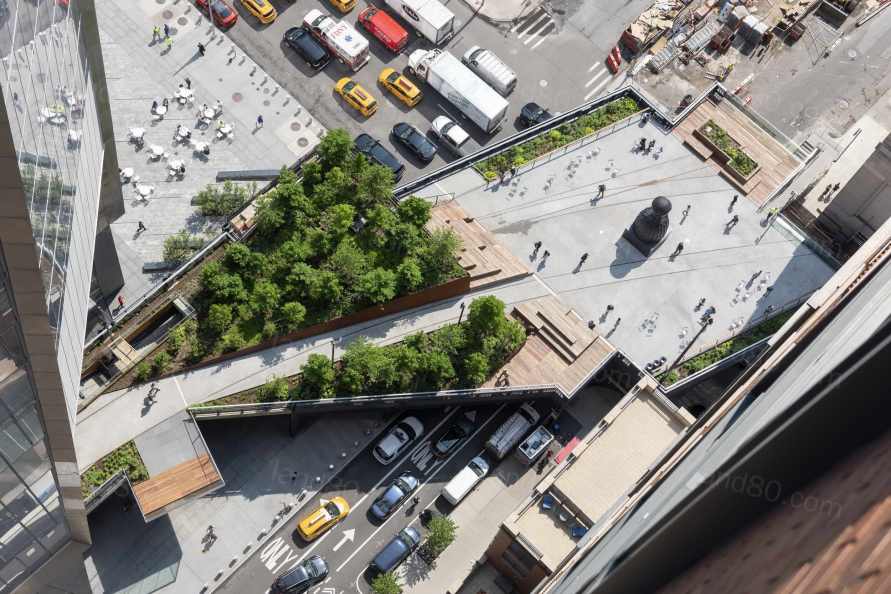高线公园是由James Corner Field Operations和Piet Oudolf合作设计的,它是一个长1.5英里的公共公园,建在一条废弃的高架铁路上,从肉类包装区延伸到曼哈顿的哈德逊铁路场。
Designed in collaboration with James Corner Field Operations and Piet Oudolf, The High Line is a 1.5–mile long public park built on an abandoned elevated railroad stretching from the Meatpacking District to the Hudson Rail Yards in Manhattan.





发现这个新公园的灵感来自于这个后工业化废墟的忧郁、不羁之美,大自然在这里开垦了一块曾经重要的城市基础设施,新公园诠释了它的遗产。它将其沦为废墟后生根发芽的生物多样性转化为沿铁路延伸的一系列特定地点的城市小气候,包括阳光充足、阴凉、潮湿、干燥、多风和遮蔽的空间。
FOUND
Inspired by the melancholic, unruly beauty of this postindustrial ruin, where nature has reclaimed a once vital piece of urban infrastructure, the new park interprets its inheritance. It translates the biodiversity that took root after it fell into ruin in a string of site–specific urban micro-climates along the stretch of railway that include sunny, shady, wet, dry, windy, and sheltered spaces.



设计
通过农业技术策略,高线公园地面被数字化为离散的铺装和种植单元,沿着1.5英里的路程组装成不同的梯度,从100%的硬质景观过渡到100%的柔软、植被丰富的生物群落。铺装系统由独立的预制混凝土板组成,并有开放的接缝,以鼓励野草等新兴植物通过人行道的裂缝生长。长长的铺装单元的两端呈锥形,梳理成种植床,创造了一个有质感的"无路"景观,公众可以在这里以无规则的方式蜿蜒前行。该设计解决了许多公民问题:开垦无人认领的公共空间,适应性地重新利用过时的基础设施,并将保护作为可持续发展的战略。公园容纳了野生的、栽培的、亲密的和社会的。
DESIGN
Through a strategy of agri–tecture—part agriculture, part architecture—the High Line surface is digitized into discrete units of paving and planting which are assembled along the 1.5 miles into a variety of gradients from 100% paving to 100% soft, richly vegetated biotopes. The paving system consists of individual pre–cast concrete planks with open joints to encourage emergent growth like wild grass through cracks in the sidewalk. The long paving units have tapered ends that comb into planting beds creating a textured, “pathless” landscape where the public can meander in unscripted ways. The design addresses a multitude of civic issues: reclamation of unclaimed public space, adaptive reuse of outmoded infrastructure, and preservation as a strategy for sustainability. The park accommodates the wild, the cultivated, the intimate, and the social.








开放后高铁从2009年开始分段对外开放,2011年、2014年、2019年分阶段开放。从纽约市投资的1.15亿美元来看,高铁刺激了超过50亿美元的城市发展,并创造了1.2万个新的就业机会。高线公园最初被想象成一个奇特的地方性解决方案,去年吸引了800万游客,并作为全球发展模式 "爆炸式"传播:全球一百多个城市受到启发,将其陈旧的城市基础设施改造成公共公园。
POST OCCUPANCY
The High Line opened to the public in sections, starting in 2009, with phased openings in 2011, 2014, and 2019. From New York City’s investment of $115 million USD, the High Line has stimulated over $5 billion USD in urban development and created 12,000 new jobs. Initially imagined as a singular, idiosyncratic, local solution, last year the High Line drew 8 million visitors and has “gone viral” as a global development model: over one hundred cities worldwide have been inspired to transform their obsolete urban infrastructure into public parks.




Project: Spur, High Line 2019
Design Firm: Diller Scofidio + Renfro, James Corner Field Operations, Piet Oudolf
Size (Gsf) : 310000
Location: New York, United States
Partner-In-Charge: Ricardo Scofidio
Partners: Elizabeth Diller,Charles Renfro,And Benjamin Gilmartin
Project Director: Matthew Johnson
Project Architects: Tobias Hegemann,Miles Nelligan,Ben Smoot,And Trevor Lamphier
Design Team: Chiara Baccarini,Robert Condon,Hayley Eber,Gaspar Libedinsky,Jeremy Linzee,David Newton,Dan Sakai,Don Shillingburg,Flavio Stigliano,Brian Tabolt,Dustin Tobias,And Alex Knezo
James Corner Field Operations: Landscape Architecture And Urban Design
Piet Oudolf: Planting Design
Burohappold: Structural And Mep Engineering
Robert Silman Associates: Structural Engineering And Historic Preservation
L’Observatoire International: Lighting Design
Pentagram: Signage
Photo Credit: Iwan Baan, Liz Ligon, Timothy Schenck
|